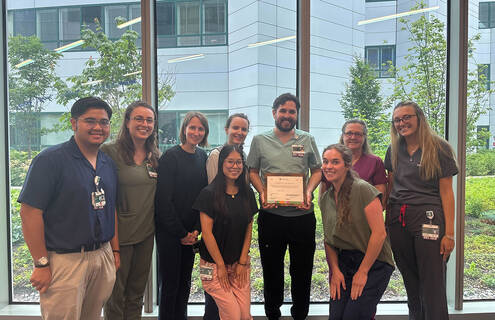
Some newborns are born too young or sick to eat by mouth. Supported by dietetic technicians, the Milk Drops Program is an initiative at Dartmouth Health Children’s Intensive Care Nursery (ICN) for the most fragile babies.
Because of the program and the work of the Milk Lab’s dietetic technicians, parents and staff caring for very young or sick babies can give breast milk or formula straight to a baby’s mouth from a syringe.
This oral sensory experience helps the baby develop feeding readiness. It gives you, as a parent of a newborn in need of support, the opportunity to interact and experience the difference that feeding your baby can make.
You also get a chance to start learning your baby’s behavioral cues.
Why dietetic technicians are important
The Milk Lab’s dietetic technicians are instrumental to the Milk Drops Program in part because they draw up syringes of milk.
“This is done in an aseptic environment once a day for a 24-hour supply,” says Team Lead Derry LaBombard. “Last night, we drew up 94 syringes for 18 babies. It’s a big undertaking, but we’re getting the babies to a level where they're able to go home, so we're helping them grow. That feels like a good thing.”
The dietetic technicians also make individual feeds for other babies in the ICN, pediatric unit, and birthing pavilion.
LaBombard says, “Milk from those mothers is brought to the lab to be fortified with extra calories, protein and minerals, based on instructions from the providers or the dietitian.”
When a mother’s own milk is not available, pasteurized donor human milk may be used, or dietetic technicians can mix powdered formula with sterile water.
“We mix what’s needed for the first 12 hours, then we mix the other half for the remaining 12 hours. This morning, we prepared 65 feeds for 16 babies,” says LaBombard.
The dietetic technicians in the Milk Lab perform other duties, too, including screening, diet education, and patient monitoring.
How the Milk Lab and the Milk Drops Program began
The Milk Lab was created five years ago when nurses were mixing breast milk at the bedside. Before LaBombard's team took over the Milk Drops Program, nurses also prepared syringes when time allowed.
Now, nurses can focus on caring for mothers and their babies.
“We’ve taken a lot of the stress away from the nurses,” says LaBombard. “We’re helping provide the best quality of care we can.”
LaBombard and his team receive a CHaDvocate Award
LaBombard and his team recently were part of a CHadAvocate award, recognizing their role in helping to make the Milk Drops Program sustainable and systematic.
The award cited the dietetic technicians for regularly attending meetings and providing valuable input, which allows the program to be continually refined.
“It’s a big thank you to the team,” LaBombard says. “They are very hard-working, caring, and passionate about what they do.”
A modified version of this story, entitled Feeding Fragile Babies, first appeared in the August 2025 issue of Connections, Dartmouth Health’s employee magazine.